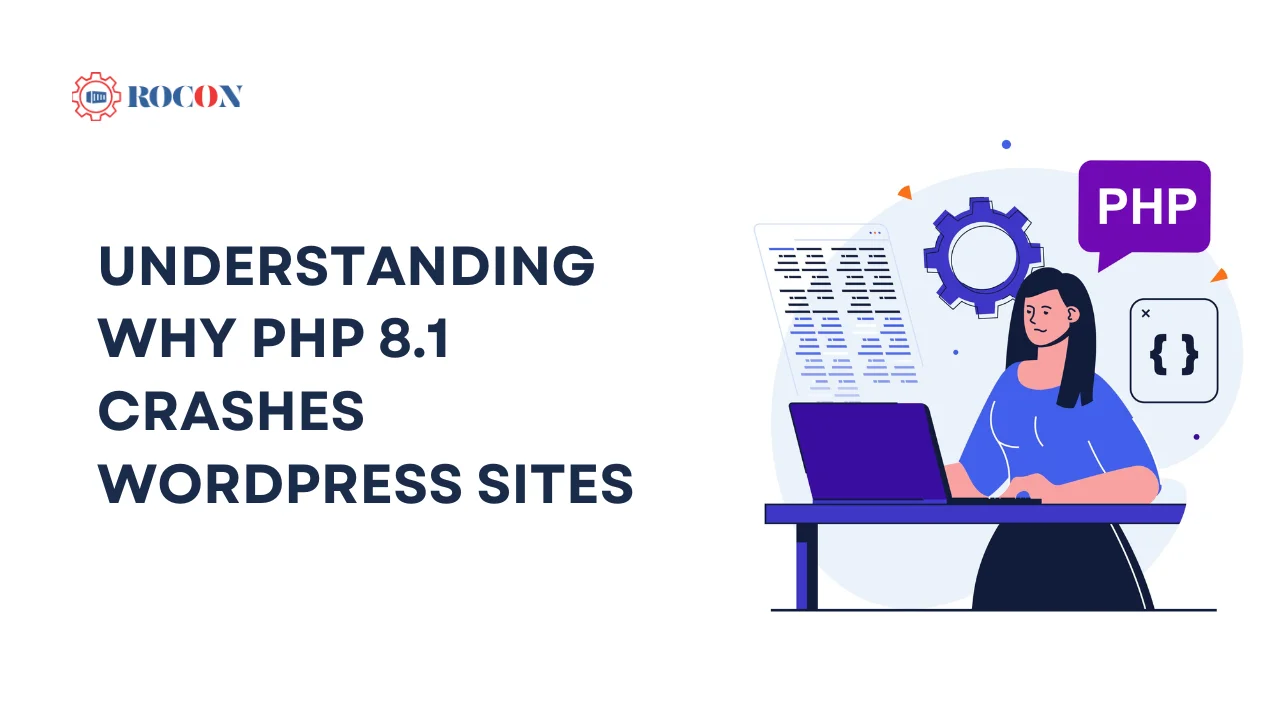Introduction: Updating to PHP 8.1 Crashed My WordPress Site
Updating to PHP 8.1 Crashed My WordPress Site: Many website owners and developers have eagerly anticipated the new features and performance enhancements of PHP 8.1 since its introduction.
The introduction of readonly properties to improve data immutability, fibers to enhance asynchronous programming capabilities, and numerous performance enhancements to increase website speed are among the most significant updates.
PHP 8.1 is an appealing choice for developers who are committed to modernizing their codebases, as it includes new functions and built-in features such as array_is_list() that facilitate more intuitive array tests and optimizations that reduce resource consumption. Nevertheless, the transition to PHP 8.1 may occasionally result in unforeseen obstacles, such as compatibility issues and site failures.
This guide will assist you in troubleshooting the situation and investigating potential solutions to restore your WordPress site to its operational state if you have encountered a malfunction as a result of updating to PHP 8.1. Key solutions, including enabling debugging mode, examining error logs, identifying common plugin or theme incompatibilities, and switching back to a previous PHP version, will be taught.
Furthermore, we will address sophisticated methodologies, including the restoration of backups, the testing of plugins or themes in a staging environment, and the communication with plugin or theme developers to request assistance.
Understanding Why PHP 8.1 Crashes WordPress Sites

PHP 8.1 introduces several significant changes, including new functions, deprecated features, and stricter type checks. While these changes are beneficial for improved performance and security, they can pose problems for websites running outdated or incompatible themes and plugins.
Common Reasons for Site Crashes After a PHP 8.1 Update:
- Deprecated Functions and Incompatibilities: Themes and plugins using functions or features deprecated in PHP 8.1 may lead to errors.
- Strict Type Checking: PHP 8.1 has stricter type enforcement, which means previously lenient code can now trigger fatal errors.
- Outdated WordPress Version: Sites running on older versions of WordPress may not be fully compatible with PHP 8.1.
- Incompatible Custom Code: Custom scripts or code snippets that haven’t been tested for PHP 8.1 compatibility can cause issues.
Initial Steps to Take When Your Site Crashes
When faced with a site crash, it’s crucial to stay calm and methodical. Follow these initial steps to troubleshoot the issue:
1. Switch to an Earlier PHP Version
If your hosting provider allows it, switch back to the previous version of PHP that your site was using before the update. This can provide immediate relief and give you the space to troubleshoot without a completely broken site.
2. Enable Debugging Mode
Enabling WordPress debugging mode can help identify which parts of your site are triggering errors. To do this:
- Access your wp-config.php file via FTP or your hosting control panel.
- Add or modify the following lines:
define(‘WP_DEBUG’, true);
define(‘WP_DEBUG_LOG’, true);
define(‘WP_DEBUG_DISPLAY’, false);
- Check the debug.log file in the wp-content directory for error details.
3. Review Error Logs from Your Hosting Provider
Many hosting providers offer access to server error logs. Review these logs for PHP errors, warnings, or notices that occurred after the update.
Common Errors and How to Fix Them
Below are some of the most common errors encountered when updating to PHP 8.1 and their solutions:
1. Fatal Error Due to Deprecated Functions If you encounter errors related to deprecated functions, such as create_function() or older array syntax:
- Update all plugins and themes to their latest versions.
- Replace deprecated functions in custom code with their modern equivalents.
- Refer to the PHP 8.1 migration guide for more information.
2. Type Errors (e.g., TypeError: Argument X passed must be of type) PHP 8.1 enforces stricter type checks. If you see TypeError messages:
- Review the error log to identify which file and function are causing the issue.
- Update the affected code to meet type expectations. For instance, ensure variables are explicitly cast to the correct type.
3. Plugin or Theme Incompatibility Certain plugins or themes may not yet be compatible with PHP 8.1:
- Temporarily disable all plugins by renaming the plugins folder to plugins_old.
- Activate plugins one by one to find the culprit.
- Check the plugin’s documentation or support forums for compatibility updates.
4. White Screen of Death (WSOD) A WSOD often indicates a fatal error:
- Check the debug.log for fatal error messages.
- Ensure that memory limits are sufficient by adding:
define(‘WP_MEMORY_LIMIT’, ‘256M’);
- Identify and fix any errors in custom code or incompatible plugins/themes.
Advanced Troubleshooting Techniques
If basic troubleshooting doesn’t resolve the issue, consider the following advanced techniques:
1. Restore a Backup
Restoring a backup can be a reliable way to get your site back up and running. Ensure you have a full-site backup (files and database) before making further changes.
2. Test in a Staging Environment
Avoid testing fixes directly on your live site:
- Set up a staging site using your hosting provider’s tools or a plugin like Duplicator.
- Test PHP 8.1 compatibility and make necessary changes before updating the live site.
3. Contact Plugin/Theme Developers
If the issue is with a specific plugin or theme:
- Reach out to the developer for support or check for updates addressing PHP 8.1 compatibility.
- Consider replacing plugins that are no longer maintained.
4. Manually Review Custom Code
If you have custom functions or code snippets on your site, manually review them for compatibility with PHP 8.1:
- Use an integrated development environment (IDE) with PHP compatibility check plugins.
- Identify functions or code constructs that may need updating or replacement.
Blazing Fast WordPress Hosting – Power Up with Rocon!
Tired of crashes after updating to PHP 8.1? Switch to Rocon’s reliable WordPress hosting, with full PHP support and expert assistance. Get started now!
Explore More
Preventive Measures for Future PHP Updates
- Keep Your Site Updated: Regularly update WordPress core, plugins, and themes to ensure compatibility with the latest PHP versions.
- Use Quality Plugins and Themes: Choose reputable and actively maintained plugins and themes that follow best coding practices and are regularly updated.
- Regular Backups: Implement automated backup solutions to quickly restore your site if needed. Plugins like UpdraftPlus or BackupBuddy can help schedule regular backups.
- Code Review: Regularly review custom code for compatibility with modern PHP standards. Conduct code audits or hire a developer for periodic checks.
- Use a Version Control System: Implement a version control system such as Git for tracking changes to your site’s code. This helps you roll back problematic updates and manage code changes systematically.
- Monitor PHP Updates: Stay informed about upcoming PHP releases and changes by subscribing to official PHP newsletters or following updates from trusted sources.
What to Do if You Need Extra Help
If you find yourself stuck despite trying these solutions, consider the following:
- Hire a Professional: If you’re not comfortable troubleshooting or editing code, hiring a WordPress developer or a trusted IT professional can be a worthwhile investment. Professional help can save time and ensure your site is properly optimized and secure.
- Contact Your Hosting Provider: Many hosting providers offer WordPress-specific support and can assist with server-level issues or rollback options. Choose a hosting provider known for robust support, such as Kinsta or WP Engine.
- Use WordPress Support Forums: The WordPress community is robust and helpful. Post your issue in the support forums to see if others have encountered similar problems and found solutions. Engage with WordPress-related social media groups or forums like Stack Overflow for additional advice.
- Consult Online Documentation: Refer to comprehensive WordPress and PHP documentation for in-depth guidance. Resources like the WordPress Codex and PHP Manual offer valuable information for troubleshooting specific errors.
Conclusion: Updating to PHP 8.1 Crashed My WordPress Site
If you are not adequately prepared for potential complications, the process of upgrading to PHP 8.1 can be overwhelming. Mitigating risks and maintaining the stability and security of your WordPress site can be achieved by adhering to the guidelines and solutions provided in this article. Proactive compatibility checks, consistent updates, and a robust backup strategy will guarantee that future PHP updates are executed without any complications.
Keep in mind that the process of administering a WordPress site necessitates ongoing learning and adaptation. Maintaining a website that is both reliable and high-performing necessitates adhering to industry standards and remaining informed.
Key Takeaway:
Preventive measures should be implemented to ensure the resilience of your website, rather than waiting for problems to occur. Proactive management, continuous refinement, and the utilization of reliable resources for assistance are the keys to maintaining a WordPress site that is well-maintained.
Your preparedness can be improved by conducting regular code audits, engaging in continuous training, and utilizing expert advice. Maintaining a state of readiness and awareness regarding updates will enable you to confidently confront potential obstacles, regardless of whether you are an experienced developer or a site proprietor.
It is important to establish a network of dependable resources and peers who can provide you with the opportunity to share their insights and experiences, thereby enabling you to remain ahead of common pitfalls and emerging issues.
Updating to PHP 8.1 Crashed My WordPress Site FAQs
1. Should I use PHP 7.4 or 8 for WordPress?
Use PHP 8 or higher. PHP 7.4 is outdated, unsupported, and insecure.
2. Is PHP 8.1 safe?
Yes. PHP 8.1 is stable, secure, and fully supported for WordPress.
3. Can I use PHP 8.2 with WordPress?
Yes. WordPress supports PHP 8.2, and most major themes/plugins work smoothly.
4. Is it safe to update PHP version?
Yes, updating is safe if you back up your site and ensure theme/plugin compatibility.

Leave a Reply